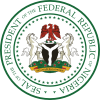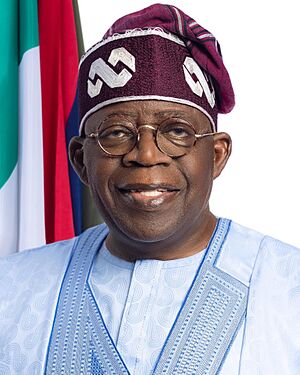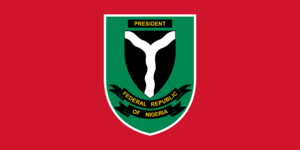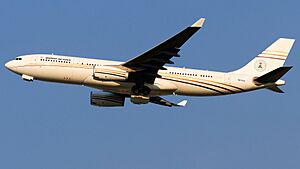President of Nigeria facts for kids
Quick facts for kids President of theFederal Republic of Nigeria |
|
|---|---|

|
|

Seal of the president
|
|
|
|
| Style | Mr. President His Excellency |
| Abbreviation | POFRON |
| Member of |
|
| Residence | Aso Rock Presidential Villa |
| Seat | Abuja, F.C.T. |
| Appointer | Direct popular election or via succession from vice presidency |
| Term length | Four years,
renewable once
|
| Constituting instrument | Constitution of Nigeria |
| Formation | 1 October 1963 |
| First holder | Nnamdi Azikiwe |
| Salary | ₦500,000,000/US$ 310,774 annually |
The President of Nigeria is the top leader of the country. They are both the head of the country and the head of the government. The President leads the Federal Government and is the commander-in-chief of Nigeria's military, the Nigerian Armed Forces.
In 1979, Nigeria's Constitution combined these two important roles into one job: the President. This means the President has a lot of power. They make sure federal laws are followed. They also choose many important government officials, diplomats, and judges. The President is in charge of Nigeria's relationships with other countries.
The President also helps create new laws and policies for the country. They can sign new laws or reject them. Presidents are usually seen as the leaders of their political parties. Their election greatly shapes the country's main policies.
The President is chosen by the people in national elections for a four-year term. The Vice President is also elected at the same time.
Bola Tinubu is the 16th and current President of Nigeria. He started his term on May 29, 2023.
Contents
Nigeria's Presidential Journey
Early Days: Ceremonial President (1963–1966)
Nigeria became independent from Britain on October 1, 1960. At first, the country had a prime minister, Alhaji Sir Abubakar Tafawa Balewa, who led the government. Nnamdi Azikiwe became the first governor-general. He represented the Queen of Nigeria, Elizabeth II.
On October 1, 1963, Nigeria became a federal republic. This meant it no longer had a queen. The role of governor-general was replaced by the President. Nnamdi Azikiwe became the first President. However, this role was mostly ceremonial. The President's main jobs were to welcome foreign guests and open Parliament.
Military Rule (1966–1979)
In January 1966, a group of army officers tried to take over the government. The prime minister was killed. Major General Johnson Aguiyi-Ironsi became the Military Head of State.
Later in July 1966, other army officers revolted. General Johnson Aguiyi-Ironsi was killed. Lieutenant Colonel Yakubu Gowon became the new military leader.
In 1975, General Yakubu Gowon was removed from power. Brigadier Murtala Mohammed became the head of the military government. After he was killed in 1976, General Olusegun Obasanjo took over. General Obasanjo worked to bring back democratic rule. This led to an election in August 1979.
In 1979, Nigeria adopted a new constitution. It created a presidential system like in the United States. The President became the main executive leader. The country also got a two-part parliament called the National Assembly. This included a Senate and a House of Representatives.
Second Republic (1979–1983)
On October 1, 1979, Nigeria returned to democratic rule after more than 13 years of military leadership. Shehu Shagari became the first democratically elected President.
More Military Rule (1983–1999)
On December 31, 1983, the military took over again. Major General Muhammadu Buhari became the new head of state.
In August 1985, General Buhari's government was peacefully overthrown by Major General Ibrahim Babangida. Babangida became President.
On August 26, 1993, General Babangida stepped down. Ernest Shonekan was chosen as an interim (temporary) head of state. However, General Sani Abacha quickly took power from Shonekan on November 17, 1993.
General Abacha died on June 8, 1998. Major General Abdulsalami Abubakar became the new head of state.
Fourth Republic (1999–Present)
On May 29, 1999, General Abdulsalami Abubakar handed over power to Olusegun Obasanjo. Obasanjo had been a military head of state before and was elected President. He served two terms in office.
On May 29, 2007, Umaru Musa Yar'Adua became President. This was the first time power was successfully passed from one democratically elected president to another in Nigeria. Yar'Adua passed away on May 5, 2010.
On May 6, 2010, Vice President Goodluck Jonathan became President.
On May 29, 2015, Muhammadu Buhari, who was also a former military head of state, became President after winning the election. He served two terms.
On May 29, 2023, Bola Tinubu was sworn in as the 16th President of Nigeria after winning the 2023 general election.
How Nigeria's President is Chosen
Electoral System
The President of Nigeria is elected using a special system. To win in the first round, a candidate needs the most votes overall. They also need to get more than 25% of the votes in at least 24 of Nigeria's 36 states and the Federal Capital Territory.
If no one wins in the first round, a second round of voting happens. This round is between the top candidate and the next candidate who got the most votes in the highest number of states. In this round, the winner still needs the most votes and over 25% in at least 24 states and the Federal Capital Territory. If there's still no clear winner, a third round is held. In the third round, the candidate with the most votes wins.
Presidential candidates run for office with a running mate, who becomes their Vice President if they win.
Who Can Be President?
According to Nigeria's constitution, a person can become President if:
- They are a Nigerian citizen by birth.
- They are at least 35 years old.
- They belong to a political party and are supported by that party.
- They have at least a School Certificate education or its equivalent.
However, a person cannot be President if:
- They have citizenship in another country (unless allowed by the National Assembly).
- They have been elected President two times before.
- They are found to be mentally unwell.
- They are under a death sentence or have been jailed or fined for a serious crime involving dishonesty.
- They were convicted of a dishonest crime or broke the Code of Conduct within 10 years before the election.
- They are bankrupt.
- They work for the government and have not resigned at least 30 days before the election.
- They are a member of a secret society.
- They have been found guilty of stealing or fraud by an official investigation.
- They have given a fake certificate to the Independent National Electoral Commission.
Taking the Oath of Office
The President of Nigeria must take an oath before starting their job. The chief justice of the Supreme Court of Nigeria gives this oath.
The oath says the President will be loyal to Nigeria. They promise to do their best, follow the Constitution and laws, and always act in the country's best interest. They also promise not to let personal interests affect their decisions. The President swears to protect the Constitution and treat everyone fairly, without fear or favor. They also promise to keep official matters secret, unless needed for their duties. Finally, they promise to serve the people of Nigeria.
Presidential Responsibilities
Key Appointments
The President of Nigeria appoints many important people, including:
- The Secretary to the Government of the Federation.
- Members of the Federal Executive Council (like a cabinet).
- Leaders of the Armed Forces.
- The Chief of Staff and other presidential aides.
- Heads of government departments and agencies.
- Ambassadors to other countries.
Commander-in-Chief
The President is the ultimate leader of the Nigerian Armed Forces. This means they give military orders, decide on defense policies, and appoint top military leaders like the Chief of Defence Staff.
Foreign Policy
The President decides how Nigeria interacts with other countries. They represent Nigeria in international meetings, lead negotiations, and sign important agreements with foreign nations.
Ceremonial Duties
The President also has ceremonial roles. For example, they are the grand commander in the Order of the Federal Republic, which is a special honor.
How Long Does a President Serve?
The President of Nigeria serves for four years. They can be re-elected only once, meaning they can serve a maximum of two terms.
Where the President Lives
The President of Nigeria lives and works in the Aso Rock Presidential Villa in Abuja.
Protecting the President
Several groups work together to protect the President of Nigeria. These include the State Security Service (SSS), the Presidential Guards Brigade, and the Nigerian Air Force. The Nigeria Police Force also helps.
State Security Service (SSS) The SSS protects important government officials, including:
- The President and Vice President.
- The President of the Senate and the Speaker of the House of Representatives.
- The Chief Justice of Nigeria.
- State Governors and their deputies.
- Former Presidents and their spouses.
- The immediate family members of these officials.
- Candidates running for President, Vice President, and Governor.
- Visiting leaders from other countries.
The SSS also protects anyone in the line to become President.
Presidential Guards Brigade This is a special unit of the Nigerian Army. Their jobs include:
- Keeping the President, the Presidential Villa (Aso Rock), and official guests safe.
- Protecting the Federal Capital Territory (Abuja) from dangers like terrorism.
- Gathering information to prevent threats.
- Helping with security and military operations in Abuja.
- Performing ceremonial duties at official events.
- Managing crowds during public gatherings.
This brigade reports directly to the President.
Security During Travel When the President travels by air, the Nigerian Air Force and the SSS work together. The Air Force manages the presidential aircraft and watches the airspace. The SSS provides security inside the plane.
When the President travels by land, the SSS is in charge of security. They use armored vehicles for safe travel. The Nigerian Air Force might also provide air support during these trips.
Presidential Motorcade The President's motorcade (a group of vehicles traveling together) usually has about 30 vehicles. These include:
- Police motorcycles and lead cars to clear the way.
- SUVs carrying SSS personnel and special equipment.
- Armed units from the SSS and the Presidential Guards Brigade.
- Communication vehicles.
- Vans for approved media.
- An ambulance for medical emergencies.
The SSS takes care of the President's main vehicles, while the Presidential Guards Brigade looks after the other convoy vehicles.
How the President Travels
For land travel, the State Security Service (SSS) is responsible for the President's safety. They use a fleet of armored vehicles for official and private trips. The Nigerian Air Force can provide air support if needed. SSS personnel work closely with the Presidential Guards Brigade and special police units for close protection.
In the past, the Mercedes-Benz S-Class was often used as the official state car. It has advanced security features and is very comfortable.
However, since his inauguration in 2023, President Bola Ahmed Tinubu has chosen an armored Cadillac Escalade as his official vehicle.
The Nigerian Air Force provides aircraft for the President's air travel. As of 2024, the presidential air fleet includes:
- A Boeing Business Jet (BBJ 737)
- A Dassault Falcon 7X Jet
- Two Gulfstream Jets (500 and 550)
- Two AW-189 helicopters
- Two AW-139 helicopters
- An Airbus A330
See also
 In Spanish: Presidente de Nigeria para niños
In Spanish: Presidente de Nigeria para niños
- List of governors and governors-general of Nigeria
- List of presidents of Nigeria
- Nigerian presidential inauguration
- Nigerian Presidential Transport Fleet
- Prime Minister of Nigeria
 | Kyle Baker |
 | Joseph Yoakum |
 | Laura Wheeler Waring |
 | Henry Ossawa Tanner |




